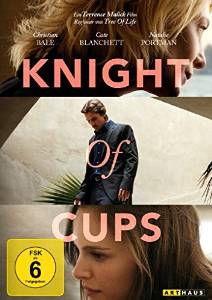 Knight of Cups (2016)
Knight of Cups (2016)
Even those who admire the work of director Terrence Malick can feel ambivalent about his films. "That was a long two hours," said my viewing partner. Maybe that's no surprise for a movie with no script and no dialogue, only improvisations based upon character descriptions at the beginning of each day's shoot. There's no linear narrative in "Knight of Cups," just a succession of dreamy film fragments with whispery voice overs. Those fragments mimic the life of Rick (Christian Bale), an LA screen writer who drifts through life staring into space and searching for some meaning. He's an excessively prodigal pilgrim, deeply lost, who admits that he's "spent thirty years ruining my life instead of living it." Perhaps that's the definition of damnation, he muses — when the fragments of your life never fit into a coherent whole. This is a world, we learn, "with no principles, only circumstances." The movie begins with and contains subsequent voice over readings from John Bunyan's Pilgrim's Progress (1678), which "was delivered under the similitude of a dream" — just like this movie. There are many signs and messengers along the way, if we would pay attention — the beauty and terror of the natural world, joyful children and lonely old people, homeless people in the gutter and the beautiful rich at their decadent pool parties, family traumas, Buddhist and Catholic priests, a snippet from Psalm 51, a fortune teller, Tarot Cards, and those most powerful of twin forces, thanatos and eros — lots and lots of loveless eros. Rick's problem isn't a lack of meaning, but a surplus of meaning, as with Wordsworth: "the world is too much with us." Our sufferings and troubles, suggests a Christian pastor, are in fact gifts from God to point us to a better way to live (God's megaphone, in the parlance of CS Lewis). But it's not clear whether Rick really wants to hear this message. He wears a smirk in some of his scenes, and one reviewer noted the ambivalence he felt — whether he envied or pitied Rick. But for those who want to find that narrow path to a different life, the very last word of this mashup of the Book of Ecclesiastes and the parable of the Prodigal Son is simple: "Begin."
Even if this feels cliched, or subtle as a sledge hammer, there's still a very good reason to see "Knight of Cups" — the cinematography of Emmanuel Lubezki, who won Oscars for The Revenant, Gravity, and Birdman. The word on the street is that Malick has two more films in post-production.


